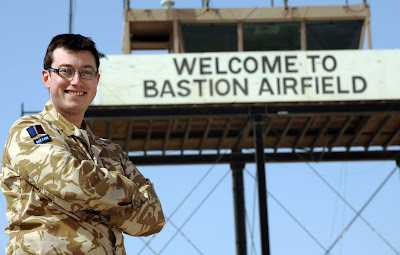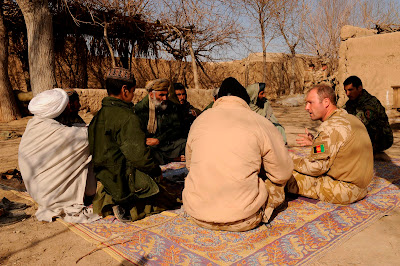
Viking Armoured Personnel Carrier
We are back in from the first phase of Op Moshtarak and it is great to be back in camp with hot showers and fresh food.
The last few weeks have been a real experience working as part of the Manoeuvre Support Group; a combination of Viking Armoured Personnel Carriers and the heavy engineering vehicles of 28 Engineer Regiment whose job was to clear a major route into the strategic town of Showal, a settlement with a reputation for being a drug trading haven as well as the ‘seat’ of government for the Taliban.
During the pre operational training we really bonded together well. Our role was to provide the firpower and protect the slow moving column of vehicles. So we had to practise our drills together to allow the Engineers to do their job: using new equipment to plough through or explode IED belts, build bridges, fix roads, etc.
I’m a tankie by training. I’ve got D Squadron of the Royal Tank Regiment out here. We miss our Challenger tanks, but the guys love the Viking Armoured Personal Carriers and they actually enjoy being out on the ground.
On D Day (Sat 13 Feb), several hours after the helicopter assault went in, we trundled out from Camp Bastion with my Vanguard Force in front. They are a very strong, cohesive troop commanded by Lieutenant Anthony Kaulbeck who had to guide us safely around or through the areas laid with IEDs. He recced along less obvious routes to avoid classic ambush points, searching for signs of unusual human activity on the ground. I have to say that Ant has a particular talent for this. Of the 35 IEDs that the Viking Group has discovered, he has been responsible for at least half of them. Life saving stuff really.
Our most rewarding moment of the long route clearance came on Day 2 when we were observing arcs around the leaguer (that’s the place where our 44-vehicle convoy was located, Viking APCs around the outside to provide a ‘metal fort,’ with Engineering vehicles in the middle), when one of the guys on sentry, Sgt Andy Ford, picked up abnormal behaviour in a field 200 metres away.
It was three young men and an elder. What was odd was that the men were acting aggressively towards the elder, pointing and remonstrating, which is a disrespectful way to carry on in a culture that respects age. The elder went back to his compound and soon a people carrier appeared. There was a lot of activity; the women and children were bundled into the vehicle. Meanwhile the men in the field were pretending to work, bending down and sowing seeds but all the time looking up at the leaguer location.
We suspected that the men were insurgents, and their likely plan was to take over nearby family compound to use as firing position that night.
I immediately broke out a Viking Quick Reaction Force (QRF) and headed to the compound. We managed to get there and stop the family leaving. And although they said that there were no insurgents around their fear was palpable. They wanted to get out.
We talked calmly to them and searched the compound. In the meantime the three young men had run away. The local people relaxed slightly. We reassured them that ISAF and Afghan forces were moving into the area to stay. In the end we got a decent night’s sleep without the small arms attack which had been brewing. Prevention was better than a firefight in this situation.
The locals do seem to want us here, but understandably are worried about the transition period when the Taliban still have influence. I have never spoken to a local who, in private, has a good word to say about the Taliban and the influence they hold in society. Maybe they are saying it because they are talking to ISAF, but I sense that people are starting to realise we are not necessarily the bad guys in all this.

Flank Protection for the Manouevre Support Group
Over the next few days we continued to provide protection as the Royal Engineers used Trojan to plough a new main route, and Python was deployed and detonated to clear a particularly difficult point with multiple IEDs on the ground. A couple of bridges were laid to improve the route access until, finally, we drove into the town of Showal and linked up with A Company 1 Royal Welsh. They had spent the week securing the town following their helicopter insertion and were very glad to see us because the route we had just cleared was soon to be used by the logistic guys bringing in fresh food, water, equipment and vital materials to build a proper patrol base.

























